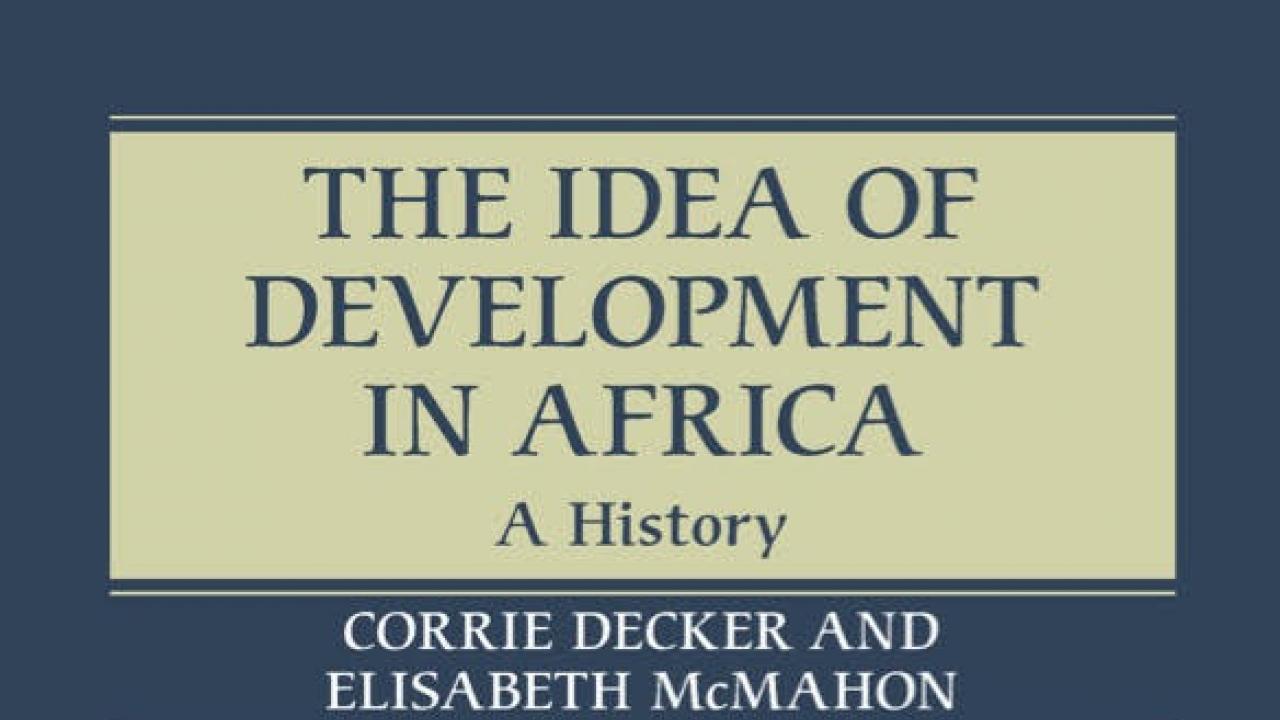
DHI Book Chat Features Discussion of Development in Africa
The DHI’s first book chat of the year featured authors Corrie Decker (UC Davis) and Elisabeth McMahon (Tulane University) in conversation about their book, The Idea of Development in Africa: A History.
The Idea of Development in Africa traces the historical evolution of what the authors call the “development episteme,” a “knowledge system and approach that undergirds the idea that Africa needs a specifically Western style development.” The authors detail the changes and continuities in Western approaches to Africa from the eighteenth century through the present, exploring how the development episteme continues to shape developmental policy in Africa today.
Throughout the talk, the authors explained the relationship between developmental policy and the intellectual and philosophical systems that have justified that policy. Often, these intellectual edifices included scholarly work in the social sciences, and the authors highlighted the roles of both Sociology and Anthropology in contributing to and rationalizing African development projects. Decker explained how early Anthropologists worked with colonial governments to collect the ethnographic and economic data needed to build colonial industries. This legacy can still be felt today, both in the continued willingness of social science scholars to work alongside development agencies and NGOs, but also in the widely held assumption that any researcher who works on African topics must be interested in doing development work.
While The Idea of Development in Africa focuses on the ideological and philosophical underpinnings of development, the authors were clear that the development episteme manifests in concrete projects undertaken throughout the African continent. Decker and McMahon trace the continuities in the logistics of development projects, noting the often-cyclical nature of these interventions. In response to a question from the moderator, Decker described the through-line from nineteenth-century abolitionist humanism and missionary work to present human rights centered NGO projects. Like early missionary work, much of the most visible NGO work in the present is composed of ad-hoc, localized projects that are nevertheless meant to represent the idea of progress and therefore be replicable across the continent.
Looking back to the history of Western interventions in Africa can help us contextualize contemporary issues on the African continent. For example, the authors pointed to a proposal early in the COVID-19 pandemic to trial COVID vaccines and treatments in Africa. While the pharmaceutical companies argued that holding drug trials in Africa would benefit African countries who might otherwise not be able to afford the drugs, many African countries refused to take part in the trials. Decker pointed out the parallels to the earlier development of treatments for HIV in South Africa and elsewhere – retroviral drugs were tested in Africa, but patents and high costs meant that the communities in which they were tested could not access the drugs they had helped develop. Indeed, McMahon and Decker highlighted the long history of Western countries using Africa as a testing ground, not only for new medicines, but also for experimental educational models, population science, or theories of economic development, to name a few examples.
In addition to discussing their research, McMahon and Decker also gave the audience a glimpse into their writing process, sharing how they came to this book project and their approach for collaborative writing. Early in the process, both authors realized that they shared an interest in the history of development, both in their dissertation research and in their teaching. Both recognized the need for a “more cohesive narrative” around development in Africa, and the book project allowed both authors to further explore the intellectual work that they were already bringing to their classrooms and research. While both acknowledged that cowriting brought its own unique challenges like longer editing times and debates over how to organize the book, they also said that the process pushed them to explore directions in their research they might not have pursued if they had been working alone.
At the end of the talk, the authors called on non-Africans who work on Africa to critically reflect on their positionality and their role in perpetuating the development episteme. Rather than assuming that they should decide what is best for Africa, researchers should follow the lead of Africans themselves. The real question, said Decker, is whether researchers are willing to “do more listening than talking.”
You can find a recording of this event on the DHI YouTube channel.
